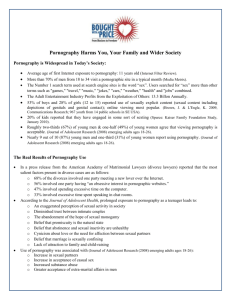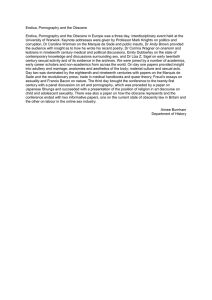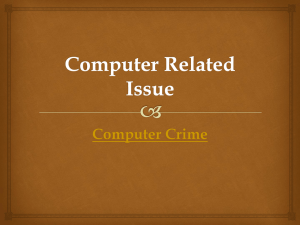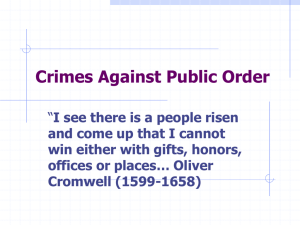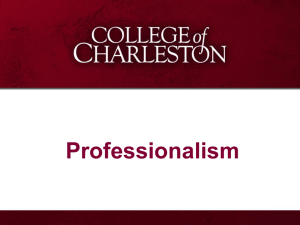Online Child Protection: The ICMEC Program Perspective
advertisement
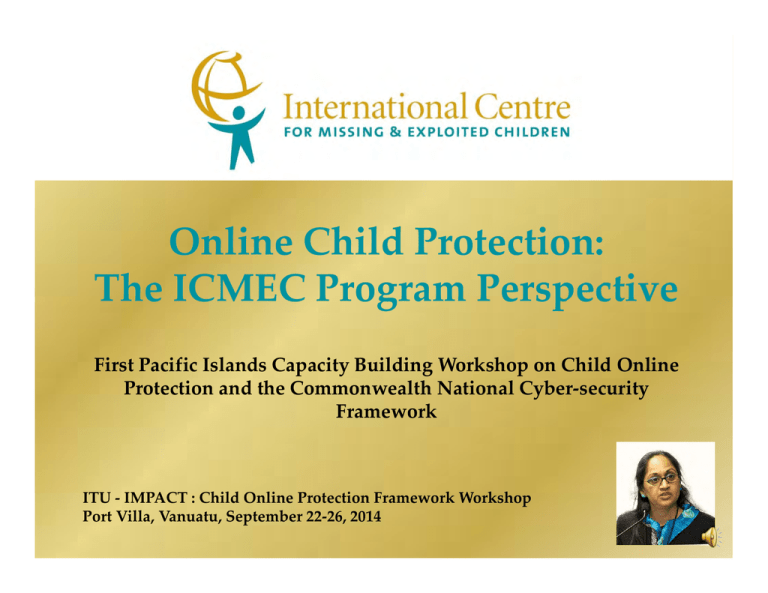
Online Child Protection: The ICMEC Program Perspective First Pacific Islands Capacity Building Workshop on Child Online Protection and the Commonwealth National Cyber‐security Framework ITU ‐ IMPACT : Child Online Protection Framework Workshop Port Villa, Vanuatu, September 22‐26, 2014 “A Global Movement to Protect Children” The International Centre for Missing & Exploited Children (ICMEC) works to protect children from exploitation and abduction globally. What we do Promotes the creation of national centers based on a public‐ private partnership model. Advocates for changes in laws, treaties, and systems to protect children worldwide; Leads a global financial coalition to eradicate commercial child pornography; Provides training and assistance to law enforcement, legal professionals, NGOs, and governments; and Fosters an international network to disseminate images of and information on missing and exploited children. National Center for Missing & Exploited Children • Serves as the U.S. clearinghouse of information on missing and sexually exploited children. • Works in cooperation with the U.S. Department of Justice and U.S. Department of Homeland Security to provide services for families and law enforcement. Reality of Child Pornography CyberTipline USA Cybertip CANADA UNODC •As of December 2013 CyberTipline has received more than 2.2 million reports of suspected child sexual exploitation since it’s launch in 1998. •As of December 2013, NCMEC’s Child Victim Identification Program has reviewed and analyzed more than 104 million child pornography images and videos since it was created in 2002. • 27 different payments types used • 85 percent sold memberships, with recurring monthly payments ranging from $4 to $490 • Industry generates 50,000 new images each year • Worth USD 250 million globally 2010 5 Internet Penetration in Oceania Oceania Vanuatu 36,724,649 266,937 7,620,480 300 24,804,226 30,164 67.5 % 11.3 % 325 % 10054% 0.5 % 0.1% Reality of Internet Connectivity Developed vs. Developing nations: Developing nations leap frogging fixed line connectivity to greater mobile connectivity Mobile phones a primary means of communication for children & young people Location of access differs – commercial vs. home, school or community centre All these have implications on adult supervision of internet usage by children. (Working Towards a Deeper Understanding of Digital Safety for Children and Young People in Developing Nations, Berkman Center for Internet & Society at Harvard University, in Collaboration with UNICEF) 7 Institutional Architecture National Legal Frameworks Law enforcement capacity High tech / cyber crime units Crimes against children units Reporting Mechanisms Other government stakeholders – Ministry of: Information, Communications & Technology Health Education Social Welfare/Family/Children & Youth Private Industry Creating National Centers Why? The search for missing and exploited children and the protection of children from victimization requires a coordinated, comprehensive, and global approach. ICMEC encourages the creation of new national, operational centers that are based on a public‐private partnership model and that are established with the support of the national government. In light of the worldwide phenomenon of missing and exploited children, it is imperative that child victims be protected and resources be made available to the victims, their families, and the professionals who serve them. Established Centers • • • • • Belgium Greece Romania South Africa Southeastern Europe Developing Centers • • • • Belarus Bulgaria India Russia Model Legislation Child Pornography: Model Legislation and Global Review Review of national legislation in place in 196 countries around the world to gain a better understanding of existing legislation and gauge where the issue stands on national political agendas. Questions Asked 1. Does national legislation exist with specific regard to child pornography? 2. Does national legislation define “child pornography”? 3. Does national legislation criminalize computer‐facilitated offenses? 4. Does national legislation criminalize possession of child pornography, regardless of the intent to distribute? 5. Does national legislation require Internet Service Providers (ISP) to report suspected child pornography to law enforcement or to some other mandated agency? Results 69 countries have legislation sufficient to combat child pornography. Of these only 11 countries have legislation which fulfill all 5 criteria. 53 countries have no legislation at all that specifically addresses child pornography. Of the remaining 74 countries that have some legislation addressing child pornography: 60 do not define child pornography in national legislation; 21 do not provide for computer‐facilitated offences; and 47 do not criminalize the knowing possession of child pornography, regardless of the intent to distribute Oceania Countries Country Legislation Child Computer Specific to Pornograp Facilitated CP hy Defined Offences Simple Possession ISP Reporting Australia Fiji Kiribati Marshall Is. Micronesia Nauru New Zealand Palau Papua NG Solomon Is. VANUATU Training & Technology Tools Computer Facilitated Crimes Against Children; Microsoft ‐ Photo DNA license donated to NCMEC; Project Vic; and Technology Coalition Financial Coalition Against Child Pornography (FCACP) Established in 2006 by NCMEC and ICMEC with one goal to disrupt the economics of the child pornography business “If people were purchasing heroin and cocaine and using their credit cards, we would be outraged and would do something about it. This is worse.” Senator Richard C. Shelby, Chairman of the U.S. Senate Banking, Housing, and Urban Affairs Committee 15 U.S. ‐ FCACP Members • • • • • • • • • • • • • • • • • • America Online American Express Company Banco Bradesco Bank of America Bank of New York‐Mellon Capital One Chase Paymentech Solutions CheckFree Citigroup CyberSource‐Authorize.Net Deutsche Bank Americas Discover Financial Services LLC Elavon First Data Corporation First National Bank of Omaha Global Payments Inc. GoDaddy.com, Inc. Google • • • • • • • • • • • • • • • • • Green Dot Corporation HSBC‐North America JP Morgan Chase MasterCard Microsoft National Processing Company North American Bancard PayPal Premier Bankcard, LLC Propay Inc. Standard Chartered Bank Visa We Pay Wells Fargo Western Union Xoom.com Yahoo! Inc. FCACP efforts The FCACP has published three thought‐leadership pieces: Internet Merchant Acquisition and Monitoring Best Practices for the Prevention and Detection of Commercial Child Pornography, 2007; Trends in Migration, Hosting and Payments for Commercial Child Pornography Websites, 2008; and Trends in Online Crime and Their Potential Implications in the Fight Against Commercial Child Pornography, 2011. Webinar ‐ Keeping Child Pornography Merchants Out of the Payments System 17 How Do We Know It Is Working? A 50 percent drop in the number of unique commercial CP websites reported into the U.S. CyberTipline; Increasingly difficult for law enforcement to do a test transaction with a traditional payment tool; Positive feedback from LE and US Department of the Treasury; Some sites refusing U.S.‐issued credit cards; Significant increase in the subscription price of child pornography sites 18 Asia Pacific Financial Coalition Against Child Pornography Established in 2009 by ICMEC in Singapore ONE Goal: disrupt the economics of the trade 19 APAC ‐ FCACP Members Abacus Mutuals Australia Allen & Overy American Express Australasian Cards Risk Council Australian Federal Police Child Wise Australia Citi Asia Pacific ECPAT International ECPAT Child Alert New Zealand Eftpos Australia Facebook Google G2 Web Services Inter‐Agency Council Against Trafficking , Philippines Department of Justice MasterCard Microsoft New Zealand Department of Internal Affairs PayPal Standard Chartered Bank, Singapore Terre des Hommes, Netherlands Thai Bankers Association Trend Micro TrustWave Uniting Church in Australia U.S. ICE Verisite Visa Xoom.com Yahoo! Inc. 20 APAC‐FCACP Efforts Regional APAC‐FCACP meetings PayPal sponsored Technology Challenges WG Best Practices to Help File Hosting and File Sharing Companies Fight the Distribution of Child Sexual Exploitation Content Considerations for Protecting Children & Your Company’s Reputation when Engaging with Digital Businesses First Data: Industry Education Webinar ‐ Keeping Child Pornography Merchants Out of the Payments System Legal Framework Research by Allen & Overy and affiliates in Asia Country‐specific Roundtables – New Zealand, Australia 21 Moving Forward Awareness is key. Harmonized and consistent laws are essential. These laws must include common definitions, uniform penalties, and provisions that allow for information to be shared across borders. Complying with international legal standards is an initial step in addressing child pornography, to be followed by national implementing legislation. Disrupting both the demand for and supply of child abuse images. Concerted effort by governments, law enforcement, industry, and civil society to ensure that the world’s children are protected. Important to train key personnel, encourage industry responsibility, and foster cross‐sectoral collaboration. Moving Forward “To deal with these markets, creative solutions are needed, drawing on techniques not necessarily found in the law enforcement toolkit.” The UN Office of Drugs and Crime ‐ The Globalization of Crime: A Transnational Organized Crime Threat Assessment, June 2010. “ [o]ur challenge is to reach the problems before the problems reach us…” Juan Miguel Petit, the U.N. Special Rapporteur on the Sale of Children, Child Prostitution, and Child Pornography, 2006. 23 ICMEC at a glance… Thank You Contact: Bindu Sharma Asia Pacific Policy Director email: bsharma@icmec.org

